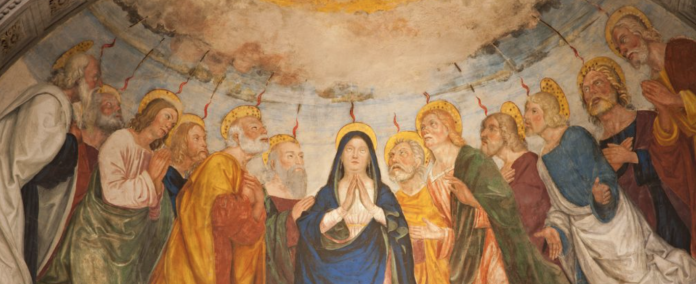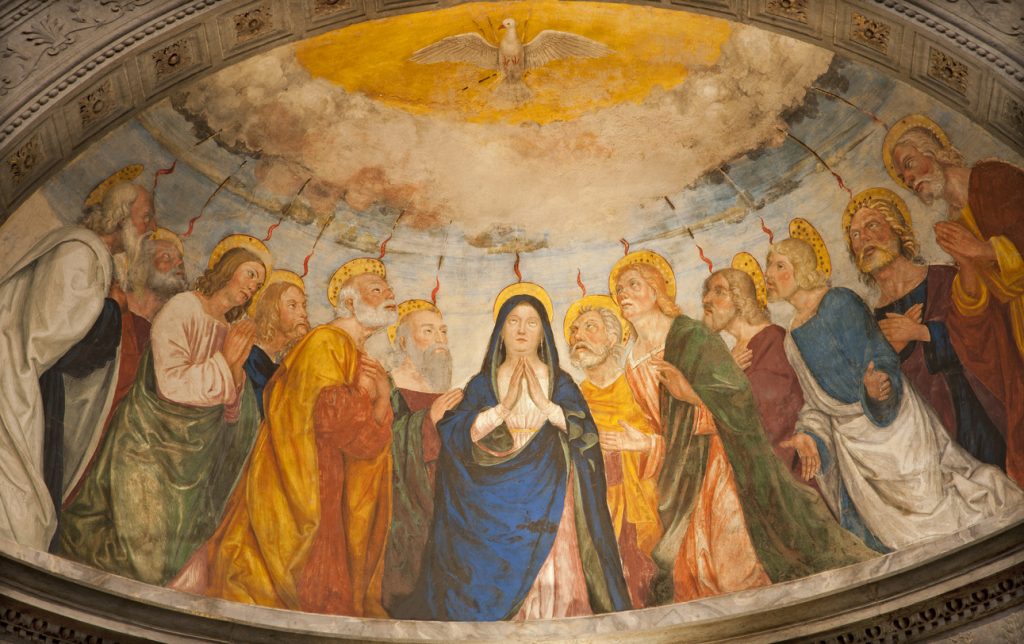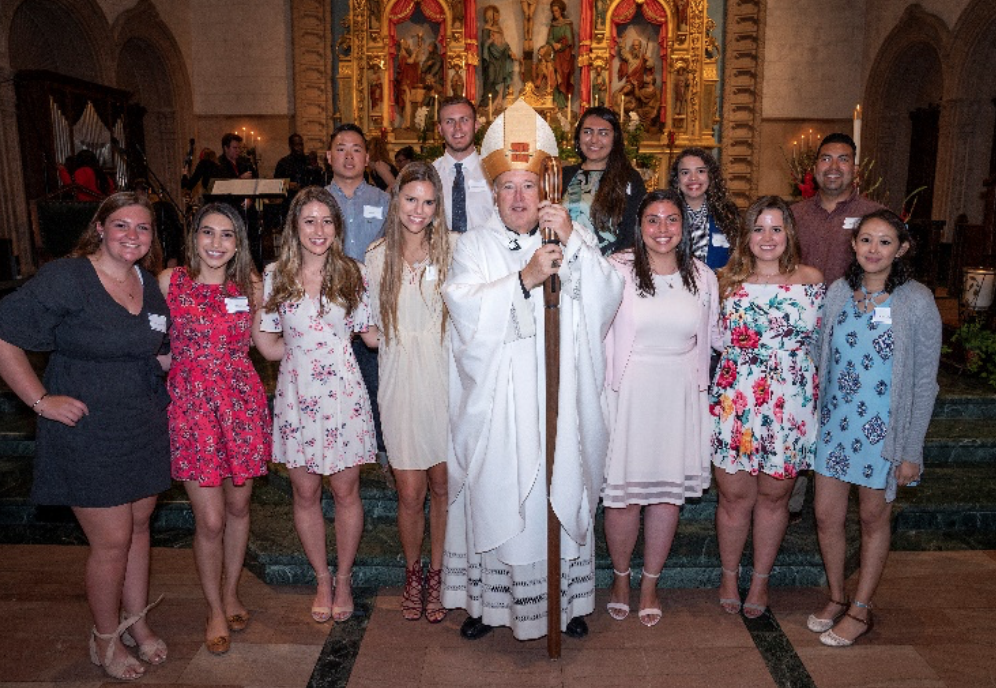
FR. ROBERT CAPONE
Reflections from leaders in the field in the Diocese of San Diego
Part I

Pope Francis calls for a revolution of tenderness. Does such a call for revolution suggest that our world can be harsh or impersonal? If one of the signs of the times is harshness, might kindness, a fruit of the Holy Spirit, be a reply? After all, tenderness is what makes human love human. Kindness is expressed in caring, hoping, patience and attentiveness. When the Holy Father wears the woolen band of the Pallium over his shoulders, I imagine the Good Shepherd and feel the tenderness that flows through his kind voice and gestures.
Recently, I asked some religious education directors and catechists of the Diocese of San Diego what they perceive to be signs of the times. The question was followed by an exercise: circle the names or attributes of the Holy Spirit that most appeal to you or expressions urgently needed now. The most popular responses among twenty-eight attributes can be placed into four categories. The first category is ‘Father of the Poor,’ from the Sequence at Pentecost and refers to the Holy Spirit as consoler and enkindling fire of charity. The second category is ‘Spirit of Truth and Source of Virtue’. The third category is ‘Wisdom and Guide’. The fourth category selected was the ‘Indwelling Spirit of God’.
Bill, a master catechist, speaks of his parish as a place to begin the healing process in a broken world. He says the spirit of consolation is needed, expressed first by the care we have for one another. “The opioid crisis is so vast. Many are battling addictions and can bring their journey of recovery into the sacramental life of the Church.” Other participants, wishing people not to suffer the isolation of addiction, circled attributes categorized under ‘Source of Virtue and Spirit of Truth’. Jo Anne writes, “We need models of fidelity where there is a fear of commitment and models of what it means to be a gentleman or a lady.” She is disturbed by the prevalence of profanity and calls for dignity in speech and a return to the dialogue of prayer. Others cited how the splendor of truth shines in a milieu of fake news.
Michelle, a young adult, spoke of people she knows making big decisions. She sees discernment as the response from the spirit of wisdom. Such wisdom often speaks through the counsel of a guide. Cindy identifies the art of conversation with family members and friends as the ability to, “allow the Spirit to speak and know when not to … conversing in a very non-confrontational manner.” She has learned over the years, as she says, to approach things “not abrasively but gently.”
Finally, ‘the Indwelling Spirit of God’ is a response to the need for authentic community in an age of rapidification.
Part II
Rapidification is a word used by Pope Francis to describe the acceleration of change that contributes to an intensified pace of life and work. This is just one of many satellites in a system whose center is technology. He notes that interpersonal relationships are mediated through screens that can be turned on and off by command. “Meanwhile, the Gospel tells us constantly to run the risk of face-to-face encounter with others.” Yes, technology can bring people together, but the connections lack the depth people seek. This is what is suggested by respondents who identified isolation and individualism caused by technology as a sign of the times.
Josh writes that when it comes to screen time, people want to be known and look for a reply as to how they are perceived. “People want to be accepted but there is a rush to judgement fueled by social media. There is no time given to develop relationships in the true sense of a mutuality of understanding,” he observes. “Jesus biggest miracle,” Dawn quips, “is that he has twelve close friends in his thirties.” Good relationships are fostered not only through conversation but also proximity. She says that young people are very mobile and are seeking a community of shared values and stability.
‘The Indwelling Spirit’ within and among us that summons to community and creates space for genuine relationships was selected by the greatest number of catechetical ministers as the attribute of the Holy Spirit needed most for our time. Our faith in Christ grants us the shared values and mutual trust for the vulnerability essential to authentic relationship. Kevin says “people do not want a virtual community, but a real community, and the life of the Trinity is Community!” (Kevin was listening when I taught on the theme, Trinity: The Transcendence and Imminence of God.)

The descent of the Holy Spirit, contemplated through this painting of Pentecost, found in the Basilica of St. Anastasia in Verona, Italy (above) not only speaks of a transcendent God who comes close to us, but reminds us that a life in the Spirit is essentially a life in community.
Henri Nouwen writes in Behold the Beauty of the Lord: Praying with Icons:
…At first, in the story of Exodus, God is revealed as a God-for-us, guiding us out of slavery with a pillar of cloud by day, and with a pillar of fire by night (Exodus 13:21). Later, in the story of Jesus of Nazareth, God is revealed as a God-with-us (Matthew 1:24), accompanying us in solidarity and compassion. Finally, in the story of Pentecost, God is revealed as a God-within-us, who enables us to breathe the divine life ourselves. Thus, Pentecost completes the mystery of God’s revelation as Father, Son and Holy Spirit, and invites us to become fully part of the inner life of God.
The Indwelling Spirit of God not only unites us in a community of faith through all our diversity but also impels us to engage the world as Christians with the Good News.
Finally, let us now consider what attracts newly initiated Catholics to our parishes in a way that may grant renewed inspiration for evangelization.
Part III
Paula, an RCIA director, was formative in inspiring my own work in initiation ministry. She posted the paper and pencil letters of catechumens who shared why they wish to become Catholic in the foyer of the Church. Then as now, the family, the domestic church, continues to be a nexus for evangelization. Almost all the catechists who responded to the question, “Who is coming to our parishes for sacraments?” noted the influence of the family, especially around Baptism and marriage.
“Believing it for myself,” is a mantra that brings students to my office at the university. A collegian initially asked, “Why be baptized Christian if I am already loved by God?” Her question recalls the words of Ives Congar, who referencing the Fathers and Mothers of the Church, recognized that before Christ there were gifts of the Spirit, “but the Spirit had not been personally given and did not dwell substantially in believers.” She was baptized and encountered the Gift poured out through the paschal mystery.
Retreats and small faith sharing groups knit relationships of grace that bring students into the tapestry of glory. Other collegians say they are “formalizing an informal relationship” when they start the RCIA process. Many students who take introductory classes to Catholicism are curious to know more through an intellectual search for truth while others are drawn by the beauty of the Church and a pilgrimage to Rome. Several seek a deeper understanding of the Sacred Mysteries so as to participate more fully. All the students entering my office seek spiritual growth. They are familiar with the idea of God, but are called to a personal relationship with Jesus.

San Diego is a cosmopolitan city located on an international border. We speak the name of Jesus to those who are near, but also those that come to us from afar:
- A man raised in Islam sought a God who is merciful within an accepting community.
- Another person from China looks for eternal life and Christ as the “gate of heaven” resonates with him.
- The University and Diocese of San Diego advocate on behalf of “Dreamers” and are leaders in the call to bridge the distance between separated families as we welcome migrants.
Mark, an RCIA catechist, writes, “We look to how the Lord sends situations, people, and different events to us every day. We do his work by witnessing as we can, with the help of the Holy Spirit, in love and generosity.” Mark’s words — in light of reflection on expressions of the Spirit most urgent for responding to the signs of our times — bring me to a realization; the perennial role of love, joy, peace, kindness, patience, generosity, faithfulness, gentleness, and self-control (Galatians 5:22,23) in evangelization. The fruit of the Holy Spirit attracts people to the branches of our faith community that stem from the Old Vine who is Christ, ever ancient, ever new.
Rev. Robert Capone is a University Chaplain and Facilitator of the RCIA Process at University of San Diego.




